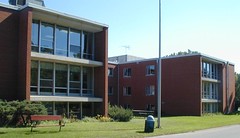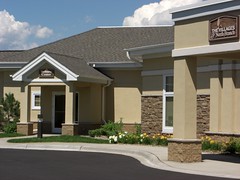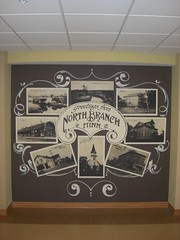Senior Housing Development in North Branch
Would you want to live in a place called Green Acres Country Care Center?That is what the county nursing home in North Branch, Minnesota was called. Thankfully, the building that looks like a cold war relic will soon be bulldozed. And North Branch seniors will have a brand new housing option.We have embarked on developing The Villages of North Branch, which will include several small neighborhoods. They will include assisted living, memory care, rehab and an area for nursing care that will be much smaller than yesterday’s institutional nursing home. The four key areas in the community are connected by a town center that will be a central gathering area. It will have a coffee shop, and gathering areas for Rotary, chapel services and exercise classes. The Villages of North Branch will open in July and will be a vibrant community within a community. The Old North Branch Nursing Home Entrance -- Total 1950s
The Old North Branch Nursing Home Entrance -- Total 1950s  Not long ago there were … Ugh… four people to a room, Never again.
Not long ago there were … Ugh… four people to a room, Never again. Gloomy, cramped, loud hallwaysBelow are some photos from The Villages of North Branch, the senior housing development that will replace Green Acres and open in July: A Whole Different Ballgame!
Gloomy, cramped, loud hallwaysBelow are some photos from The Villages of North Branch, the senior housing development that will replace Green Acres and open in July: A Whole Different Ballgame!





Global Aging
This aging thing is a global thing. Several Ecumen leaders are joining senior housing and aging services professionals from around the world in Malta at the International Association of Homes and Services for the Aging (IAHSA) Annual Conference. A few tidbits on global aging from IAHSA:
- For most of human history, until about a century ago, the elderly (people aged 65 and over) never amounted to more than 2 or 3 percent of the population. Today, in the developed world, they amount to 15 percent. By the year 2030, they will be around 25 percent. As recently as 1980, the median age of the oldest society on earth (Sweden) was 36.
- By the year 2030, the median age of the entire developed world is projected to be 45. In much of southern and eastern Europe, it will be over 50. As a whole, the developing world will remain much younger for the foreseeable future. Yet it too is ageing-hence the term 'global ageing.' Several major countries in East Asia and Latin America, including China, South Korea, and Mexico are projected to reach developed-world levels of old-age dependency by the middle of the century.
Want to see some links on discussing aging from around the world? Check this out.We’ll be back next week, have a great weekend.
Future of Senior Housing
Entrepreneur Berry Brunk and blogger (He blogs at Future of Senior Housing) shares a quote from a new study about aging in place and assisted living from the National Investment Center: “The [senior] housing industry (At Ecumen we call it a profession) needs to change its sales and marketing message to place more emphasis on these communities as places that enable residents to get more from life, rather than places to receive care. It is not being suggested that grandiose promises of entertainment and excitement be made, but rather the elements that provide a sense of community, friendship, belonging, enjoyment, fun, education and continuing life need to be stressed more.” The study isn’t available online, but Berry outlines several highlights from it that are interesting to people working to figure out and innovate in senior housing and services. You can also read what boomers are thinking about aging here.
Senior Housing Technology on TV
 Technology is already playing a greater role in helping seniors live independently and giving people more control over their lives and enhancing senior housing. The clip above is a great story about technology in use at Ecumen’s Lakeview Commons senior community in Maplewood, Minnesota.Watch this story on technology being used in senior housing. It is courtesy of WCCO-TV, the CBS affiliate in Minneapolis/St. Paul.
Technology is already playing a greater role in helping seniors live independently and giving people more control over their lives and enhancing senior housing. The clip above is a great story about technology in use at Ecumen’s Lakeview Commons senior community in Maplewood, Minnesota.Watch this story on technology being used in senior housing. It is courtesy of WCCO-TV, the CBS affiliate in Minneapolis/St. Paul.
Senior Housing Suburbia Opportunity
David Peterson has an interesting article in today’s Minneapolis Star Tribune about how baby boomers are going to create a senior tsunami in suburbia.What a great opportunity this is for senior housing and service organizations to rethink and reinvent what they deliver to their customers. As Rita DeBruyn, coordinator of the Five Cities Senior Transportation Program, which covers western burbs said: 'Twenty years ago it was subsidized senior dining or card clubs. We’d have 100 people a day gathering to play cards. Today they want to go to Panera Bread. We don’t even do 'senior dining.' And instead of card clubs, it’s Westminster Town Hall Forum, or MacPhail for concerts. They want to be intellectually stimulated.'Yes they do. We in the senior housing and senior living profession have to deliver.
Baby Boomers And Work
The Age Wave is coming. And according to this thought-provoking article 'Job Crunch Ahead as Boomers Retire' by Warren Wolfe at the Minneapolis Star Tribune, Minnesota can’t afford to lose the experience. According to Wolfe:As an aging baby boom generation nears retirement, keeping more older workers in the labor force could ease a tightening supply of skilled workers, boost income tax collections, take some pressure off a shaky Social Security system, and help older people better finance their retirement.We asked baby boomers in our Age Wave Study if they were going to retire at 65. Many aren’t. Many see work as an integral part of their life, not just a paycheck.This becomes especially important for the senior housing and long-term care professions, which are projected to have huge job shortages. Our profession is going to need to find ways to keep expertise. Also, working longer gives people more options as they consider how they want to live as seniors and how they finance long-term care.The Boomer ChroniclesThe Boomer Chronicles is a blog written by a 40-something Boston-based boomer Rhea. She’s writing about boomer life while living it. She updates continually, so always fresh and interesting content.
More Changing Aging Blogs
Recently we shared top 5 web sites that are changing aging at ProBlogger. We greatly appreciate ProBlogger’s invitation to do this. But there are many more sites that are changing aging beyond the 5 we mentioned and we will continue to share many more them at this blog over time. Here are several others: The Savvy Boomer: A goal of this blog is to unravel personal technology geek speak for boomers and seniors. The Ageless Project: Think blogging is only for the young? Think again. You’ll find a variety of senior and boomer bloggers here. Ageless Marketing: Throw away the cookie cutter. This site tackles myths of marketing to an older consumer. Boomers: Opens the door to reaching a rapidly changing marketplace. Written By Brent Green, author of the book "Marketing to Baby Boomers: Perceptions, Principles, Practices, Predictions." Very few mainstream media tackle aging. No suprise the online community is leading the way. We’d love to hear about other blogs that are looking at aging in a whole different light?
Minnesota Senior Housing Blog
There are few bloggers in the country that focus on aging and senior housing. Want to share with you another one that is right here in the Twin Cities: Lisa Dunn’s Real Sage Advice.Great blog name, but it also great content. Lisa describes her blog as a 'Discussion of Aging Issues, Senior Housing, and the Twin Cities Real Estate Market as seen through the lens of a Realtor who is a Certified Senior Advisor, and specializes in working with seniors.'
First Active Adult Community Hits Minnesota
Senior housing development in Minnesota is largely associated with assisted living, but now Minnesota’s first active adult community is coming. Popular in other parts of the country, they have been a long time coming here … and we have a hugely active 55+ populace.The first one is The Four Seasons at Rush Creek in Maple Grove. It’s being developed by K. Hovinanan Homes, a national builder.There is a housing slowdown in the Twin Cities, but this is a niche product that will likely find buyers. There’s a large group of minnesota seniors and aging baby boomers who will want this type of product.
The Silent Generation
Because there are approximately 77 million baby boomers in America and 1.5 million in Minnesota, we talk a lot about the baby boomers and their impact on senior housing and services, but the true next generation of seniors is the Silent Generation.' Gene Dolloff, who heads senior dining services at Morrison Management Specialists visited Ecumen recently and shared with us interesting information on the Silents. Morrison serves approximately 400 senior housing communities in the United States and many continuing care retirement communities, which are popular in other parts of the country, but haven’t hit Minnesota. Morisson’s research is qualitative and quantitative. Here are some interesting items from Morrison’s research as to how Silents (which were born between 1925 and 1942) differ from the GI Generation:- Silents are more assertive, questioning than GIs.- They travel more.- More independent, demonstrate more control over choices.- Less formal, more social, more vocal- More health and fitness conscious- More educatedLooking at some of the key characteristics of Silents, it’s clear that they’re going to demand different senior housing options and services as they age. Innovation can’t wait for the baby boomers.

